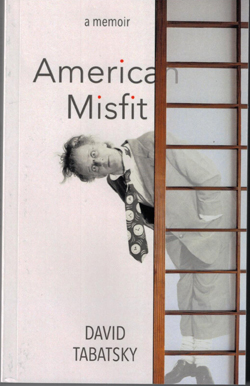American Misfit by David Tabatsky, Legacy Projects, 2017, ISBN 9781979-254083; 312 pages, $19.87.

 SAN DIEGO – David Tabatsky had been working as a street performer in Japan when he received news that his father, a cantor, was gravely ill. He flew home but arrived too late. The experience, perhaps the guilt, sent him into a tailspin, and he did something very stupid: he mailed a small supply of marijuana to his address in Japan, figuring the weed would help him feel better.
SAN DIEGO – David Tabatsky had been working as a street performer in Japan when he received news that his father, a cantor, was gravely ill. He flew home but arrived too late. The experience, perhaps the guilt, sent him into a tailspin, and he did something very stupid: he mailed a small supply of marijuana to his address in Japan, figuring the weed would help him feel better.
He was so wrong. The marijuana was seized and he was arrested.
He spent time in jail, while Japanese authorities investigated him, and later in prison to await trial on charges of drug smuggling. It was hard to say which was worse, jail where he had three cellmates with whom he couldn’t really communicate, or prison in which he was confined to a small cell, with no one to talk to.
Tabatsky’s memoir is a study in loneliness, a continuing essay on what the mind will do when it has very little stimulus. Parts of this memoir reminded me of The Royal Game, a short story by Stefan Zweig in which a prisoner became a chess champion because he had nothing to read except a book delineating the moves of chess games played by grand masters. After memorizing every one of the games, Zweig’s character started playing chess games against himself. Half his mind became the black pieces, half the white pieces.
In Tabatsky’s memoir, his brain is divided into sound mind and unsound mind – the latter urging him to do potentially self-destructive things like defying his guards and interrogators.
It took more than six weeks between his arrest and the final disposition of his case – six weeks in which random thoughts in his prison cell would trigger memories of the life he had enjoyed performing as a juggler and the devastation he had felt upon his father’s death.
Like Tabatsky himself, readers will find themselves simultaneously looking forward to his trial and dreading it. Would he be let off with a light sentence, perhaps for time served, or would the judge accept the prosecutor’s suggestion that he be sentenced to hard labor?
*
Harrison is editor of San Diego Jewish World. He may be contacted via donald.harrison@sdjewishworld.com